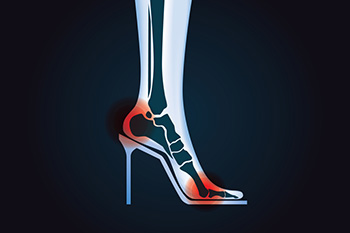
High heels came into being for some practical and vanity reasons. Men wore them so their feet fit better in stirrups when horseback riding and women wore them because they made their feet look smaller, their bodies look taller, and their legs more elongated and toned in appearance. When high heels are worn, the foot is put at a forward angle causing one to walk on their toes and changing body biomechanics, posture, and gait. This leads to a greater risk of injury and the development of painful chronic foot conditions. The higher the heel and the longer the wear, the greater the risks. When wearing high heels, one’s body struggles to stay balanced and various painful foot conditions can develop as a result, such as plantar fasciitis. If you want to continue wearing high heels, try to alternate them with other footwear, vary heel heights of shoes, and stretch calf muscles so they will not be shortened and tight. If your foot pain does not resolve, consult with a podiatrist for proper diagnosis and treatment.
High heels have a history of causing foot and ankle problems. If you have any concerns about your feet or ankles, contact David Mansky, DPM from Mansky Podiatry. Our doctor can provide the care you need to keep you pain-free and on your feet.
Effects of High Heels on the Feet
High heels are popular shoes among women because of their many styles and societal appeal. Despite this, high heels can still cause many health problems if worn too frequently.
Which Parts of My Body Will Be Affected by High Heels?
- Ankle Joints
- Achilles Tendon – May shorten and stiffen with prolonged wear
- Balls of the Feet
- Knees – Heels cause the knees to bend constantly, creating stress on them
- Back – They decrease the spine’s ability to absorb shock, which may lead to back pain. The vertebrae of the lower back may compress.
What Kinds of Foot Problems Can Develop from Wearing High Heels?
- Corns
- Calluses
- Hammertoe
- Bunions
- Morton’s Neuroma
- Plantar Fasciitis
How Can I Still Wear High Heels and Maintain Foot Health?
If you want to wear high heeled shoes, make sure that you are not wearing them every day, as this will help prevent long term physical problems. Try wearing thicker heels as opposed to stilettos to distribute weight more evenly across the feet. Always make sure you are wearing the proper shoes for the right occasion, such as sneakers for exercising. If you walk to work, try carrying your heels with you and changing into them once you arrive at work. Adding inserts to your heels can help cushion your feet and absorb shock. Full foot inserts or metatarsal pads are available.
If you have any questions please feel free to contact our office located in Hastings, MI . We offer the newest diagnostic and treatment technologies for all your foot and ankle needs.
